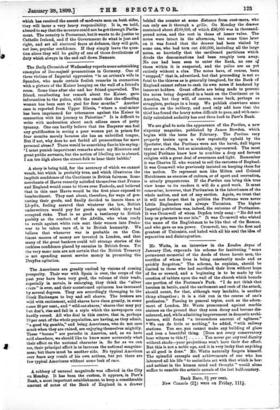Mr. Watts, in an interview in the London Argue of
January 21st, expounds his scheme for instituting "some permanent memorial of the deeds of these heroic men, the sacrifice of whose lives is being constantly made and as quickly forgotten." The scheme, he explains, should be limited to those who had sacrificed their lives without hope of fee or reward, and a beginning is to be made by the erection of tablets upon the wall of the church which bounds one portion of the Postman's Park. "I do not think that heroism in battle, amid the excitement and rush of the attack, should count, for that, although very laudable, is another thing altogether ; it is a risk run in the course of one's profession." Passing to general topics, such as the adorn- ment of London, Mr. Watts pronounced against marble statues on the ground that they soon decay and become dis- coloured, and, while admitting improvement in domestic archi- tecture, still found "a tremendous amount of ugliness." "We can do little or nothing," he added, "with railway stations. You see, you cannot make any building of glass and iron a beautiful thing. [Does not every conservatory bear witness to this You never get any real dienity without shade—your projections won't have their due effect. But this is not a noble age, and it is very lucky that anything at all good is done." Mr. Watts naturally forgets himself. The splendid example and achievements of one who has laboured all his life "to assimilate art with that which is best and noblest in the human mind and thought" would alone suffice to ennoble the artistic annals of the last balf-eentury.


















































 Previous page
Previous page